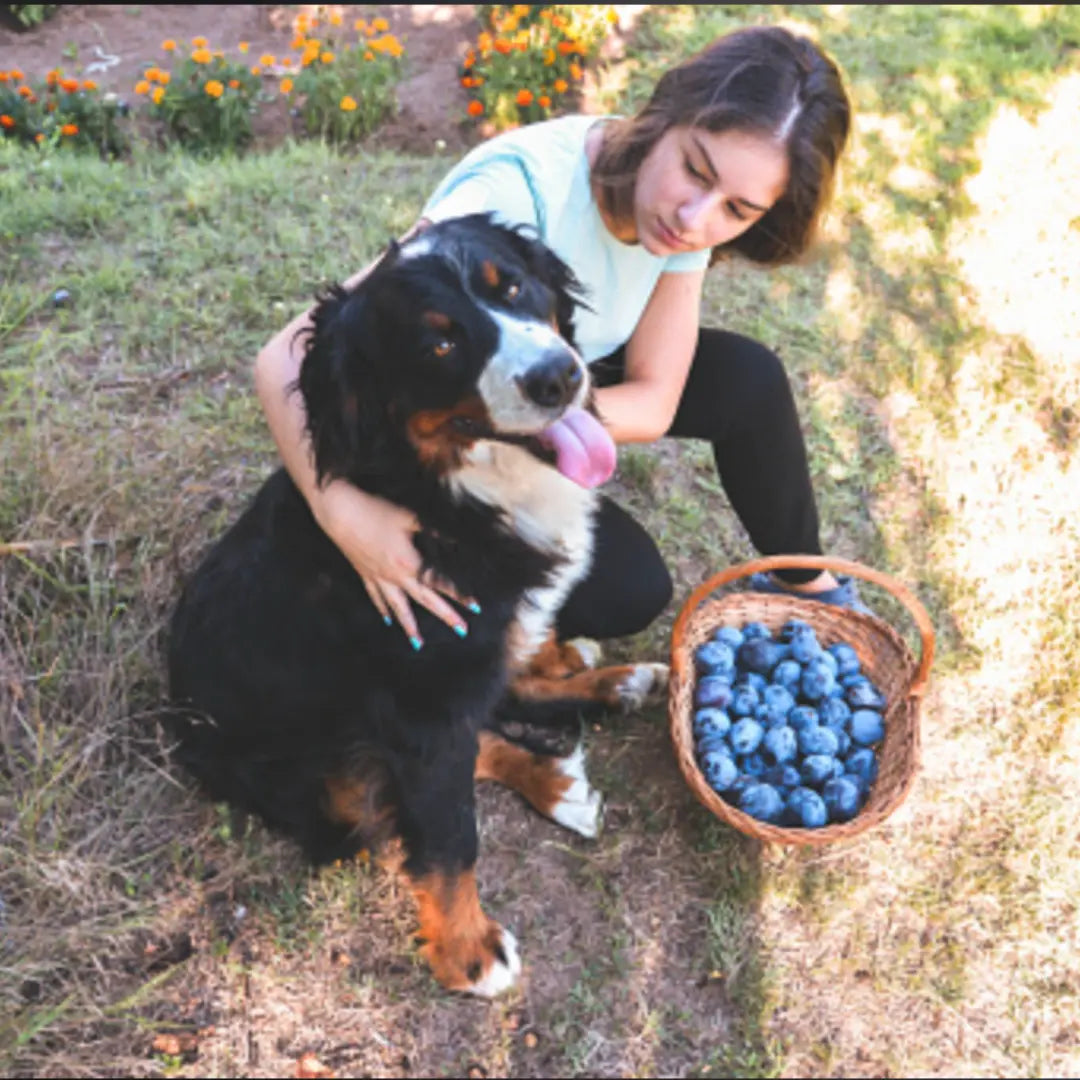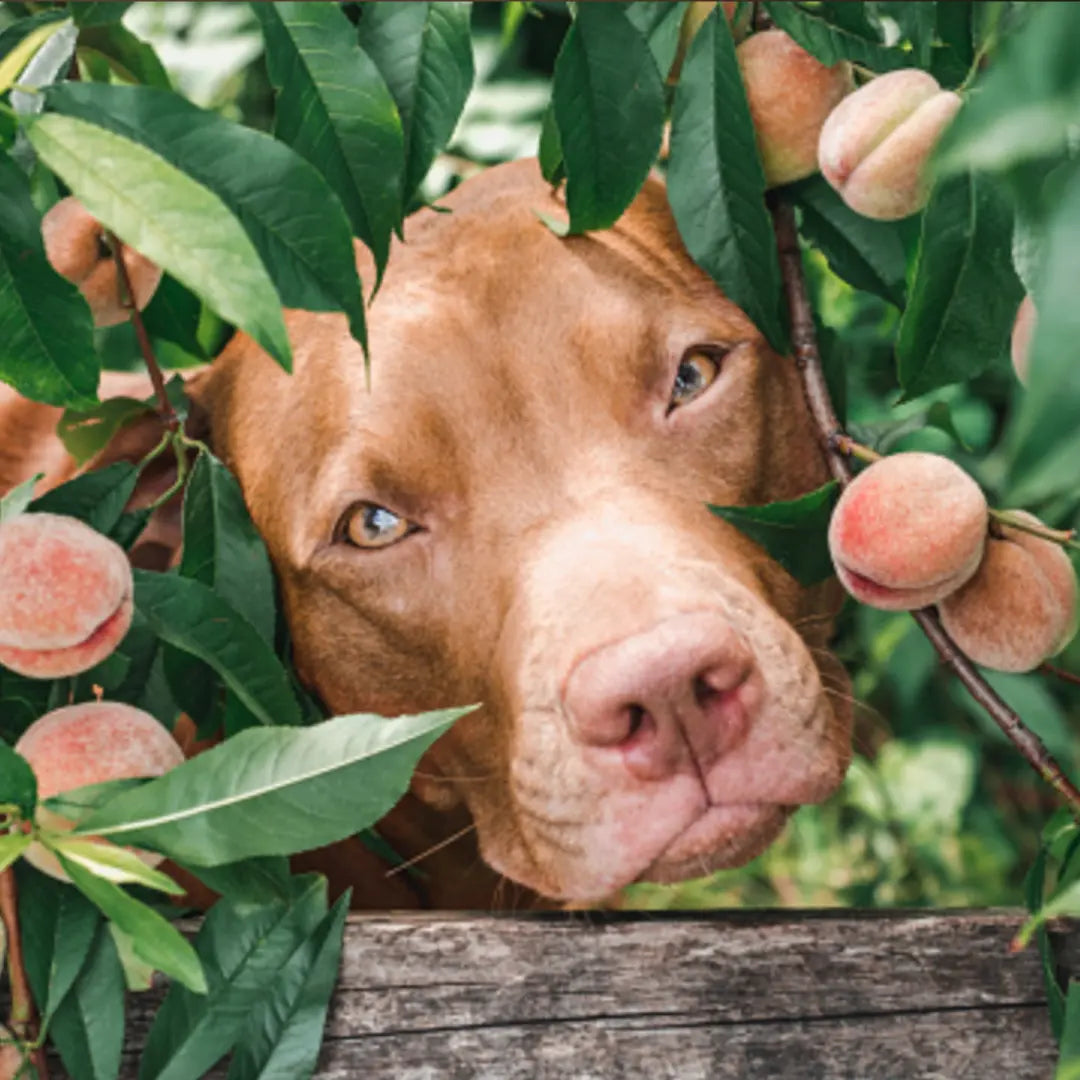Can Dogs Eat Plums Highlights
- Safe in Moderation Plums without Pits
- Never Feed Pits can cause Poisoning & Choking
- Japanese & Yellow Plums are great treats
- Plum Paste is a high fiber treat to spread on your dog’s lick mat
- No Prunes avoid feeding prunes, they often have pits & are high in sugar
Dogs adore fruits as much as we do, and there is no denying that plums are one of the juiciest and most delicious summer fruits. Despite this, dog owners have to take precautions before feeding plums to their furry friends. The reason is that not all fruits are safe for dogs to consume. This article will discuss whether dogs can eat plums and the potential risks.
Are Plums Safe for Dogs? Are Plums Bad For Dogs? Can Dogs Have Plums?
Plums are not poisonous to dogs. However, dogs have different diet restrictions, and certain breeds might react differently to certain fruits and vegetables. That said, dogs can eat plums in moderation and without the pit.
The Pit is a Big No-No
Plums are a delicious snack for humans, and we might be tempted to share some with our pups. Unfortunately, some parts of the plum are not suitable for dogs. Plum pits, or plum stones, foliage, and stems contain a compound called amygdalin. When the body processes this compound, it converts it into hydrogen cyanide, a deadly poison. Consuming amygdalin in high enough quantities can cause cyanide poisoning in dogs, sometimes known as plum poisoning or plum stone toxicity. Cyanide poisoning could cause vomiting and diarrhea in smaller doses, but in larger quantities, it could result in seizures, coma, and even death. In addition to cyanide poisoning, plum pits can be a choking hazard, resulting in difficulty breathing.
Suppose you suspect that your dog has ingested a plum pit or any other type of cyanide-containing stone fruit pits, such as peach or apricot pits. In that case, you should immediately contact your veterinarian or emergency clinic. They will advise you on the next course of action, which may involve inducing vomiting or hospitalization.
Why Should I Feed Plums to My Dog? Are Plums Good for Dogs?
Plums come packed with a variety of essential vitamins and minerals that provide numerous health benefits for your dogs.
- Aids digestion for Dogs
One of the greatest benefits of plums for dogs is that they're a rich source of fiber. This dietary fiber promotes good digestive health by preventing constipation in dogs. The insoluble fibers work like a scrub and remove any waste materials present in your dog's intestines. As a result, plums can help keep your pups' digestive tracts healthy, reducing the risk of constipation, diarrhea, or gastrointestinal infections.
- Loaded with healthy dog vitamins
Another great benefit of plums is that they contain many essential vitamins, including vitamin A, vitamin C, vitamin K, and vitamin B-6. These vitamins provide many benefits to your dog's health, such as maintaining good vision, boosting the immune system, and promoting healthy growth of red blood cells. Vitamin B-6, found in plums, helps your dog's body to produce serotonin and norepinephrine, which are essential for their emotional health.
- Antioxidant-rich
Plums also contain high levels of antioxidants such as beta-carotene and anthocyanins, which help neutralize free radicals and prevent oxidative stress in your dog. Regular consumption of foods rich in antioxidants can help enhance your dog’s immune system.
- Low in calories and fat
Plums are an excellent low-fat and low-calorie treat for dogs. They contain minimal fat and are full of water, making them an excellent dietary supplement for dogs who are trying to lose or maintain their weight.
- Improves bone health
Finally, plums contain several essential minerals, such as potassium, magnesium, and copper, which help improve bone health. These minerals assist in calcium metabolism and regulate the body's blood pH to help prevent diseases like osteoporosis. Adding plums as a part of your dog's diet can help strengthen their bones over time
Types of Plums for Dogs
Some types of plums are safe for dogs to eat, while others can be toxic. Japanese plums, yellow plums, red plums, and black plums are safe for dogs to consume in moderation.
Japanese Plums for Dogs
Also known as Ume plums, these small plums are a staple fruit in Japan. They're sweet and tart in taste, but more importantly, they're safe for dogs to eat! In fact, some dog owners use Ume plums to make a homemade paste that helps with digestion and promotes overall health for their dogs. So, if you want to share a plum with your pup, opt for a Japanese Plum.
Yellow Plums for Dogs
If you're lucky enough to have a yellow plum tree in your backyard, your dog will be in luck, too! Yellow plums are safe for dogs to eat, but as with anything, moderation is key. Make sure to remove the pits before giving your pup a slice of yellow plum, as the pits can pose a choking hazard.
Red Plums for Dogs
While red plums are safe for dogs to consume, they may not be the healthiest option. Red plums contain a high amount of sugar, which can lead to weight gain and upset stomachs in dogs. If you do choose to give your dog a slice of red plum, make sure it's in moderation and doesn't make up a significant portion of their diet.
Black Plums for Dogs
Similar to red plums, black plums are safe for dogs to eat, but should be given in moderation. Black plums are high in sugar and can lead to upset stomachs and weight gain in dogs if consumed frequently. As with any fruit, make sure to remove the pit before giving your dog a taste.
Can Dogs Eat Prunes? NO
Prunes are dried plums. Prune plums are what most people think of when they hear the word "plum." Feeding prunes to your dog is not recommended as they are high in sugar and can present a choking hazard. Some prunes even contain pits or traces of pits which can cause cyanide poisoning.
Are Plums Toxic to Dogs? Potential Risks of Dogs & Plums
Despite being a safe fruit for dogs, plums can still lead to some problems if given in excess. The high sugar content of plums can cause digestive issues, such as upset stomach, vomiting, and diarrhea. Also, since plums contain a high amount of fiber, it can lead to intestinal blockage, especially if your dog overindulges in them.
Another danger of plums for dogs is the pit. Plum pits contain cyanide, a toxic substance that can cause serious health problems for your furry friend. While it is unlikely that your dog will consume a plum pit whole, there is a risk that they could accidentally swallow one while trying to eat the fruit. If this happens, your pet may experience vomiting, diarrhea, difficulty breathing, and even death.
Even if your dog does not experience any immediate negative effects from consuming plums, it is important to note that they are high in sugar and can lead to weight gain and other health issues over time. It is best to limit your dog's intake of plums and other high-sugar fruits to help prevent obesity, diabetes, and other health problems.
There are many safe alternatives to plums and other high-sugar fruits that your dog will love. Some examples include blueberries, raspberries, and bananas. If you want to learn more about other berries you can feed your dog, our blog, Which Berries are Good for Dogs, covers some of the berries for your pup. These sweet treats are packed with vitamins and nutrients that can help keep your dog healthy and happy. Just be sure to always research any new foods before introducing them to your pet's diet.
How to Feed Plum to Your Dog?
There are many ways you can integrate plums into your dog's diet. Apart from serving them fresh, you can also use them in homemade pet-friendly recipes, such as dog-friendly smoothies or frozen fruit pops, as a healthy snack.
Make sure to thoroughly wash the fruit to remove any pesticides or chemicals that may be present. Second, start with a small amount to ensure that your dog doesn’t have any adverse reactions, such as an upset stomach. Be sure to serve plums in small pieces, and never give your dog whole plums. Finally, remember that plums should be given as a treat and should not replace your dog’s regular diet.
Plum Paste Recipe for Dogs
Ingredients
- 2 Plums
- 1 tbsp Nut Butter (sugar-free and xylitol free)
Mash together to form a paste and spread on your dog's favourite lick mat.
Easy Way to Add Fruit to Your Dog’s Diet
If you’re looking for a simple way to incorporate fibre and fruit into your dog’s meals, Dog Child Organic Oats & Berries Meals Mixes make it easy. You simply add your dog’s protein of choice with water and oil. At Dog Child, we believe our dogs deserve to eat fresh whole foods just like we do. Feeding only 20% of fresh food has been proven to extend your dog’s life and improve their long-term health. Check out more recipes in our homemade dog food community.
Moderation is Key
Like humans, dogs should consume any fruit or food in moderation, and plums are no exception. Giving small amounts of plum to your dog every so often will not harm them. Not only do plums contain antioxidants that prevent cell damage and boost the immune system, but they can also provide your dog with essential vitamins and minerals.
Conclusion Dogs and Plums
In conclusion, plums, without the pit, are safe for dogs in moderation. However, it is important to ensure that your dog does not consume too many in one go. Always observe your dog for signs of stomach upset or other complications after feeding them plums. Remember, feeding your dog in moderation and ensuring they have a well-balanced diet is key to their overall health and happiness.
FAQ
Can Dogs Eat Plums and Peaches?
Yes, both plums and peaches are safe for dogs to eat as long as you take the seed out before feeding it to your pup! Check out our blog, Can Dogs Eat Peaches, for more information about how the benefits of peaches.




